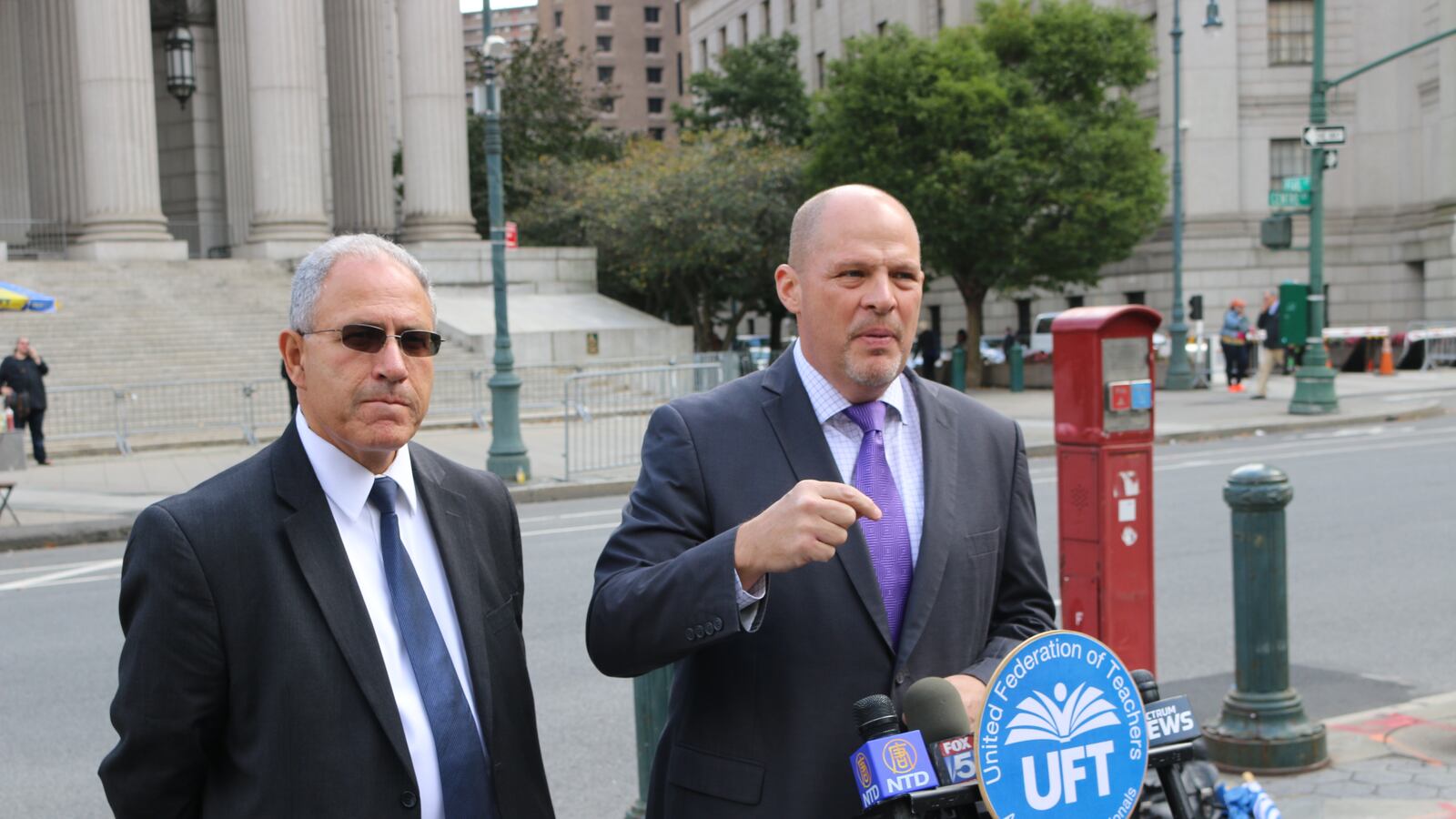The city and state teachers unions filed a lawsuit Thursday in an effort to block dozens of New York City charter schools from being allowed to certify their own teachers, setting up a showdown between powerful unions and a group that oversees some of the state’s highest-performing charter schools.
The lawsuit argues that the State University of New York — which oversees 167 charter schools across the state — overstepped its authority by allowing its schools to devise their own teacher certification programs. The unions argue that inexperienced and unqualified teachers will end up in front of children.
SUNY’s new policy would allow some charter schools to certify their teachers with as little as a month of classroom instruction and 40 hours of practice teaching, while eliminating a master’s degree requirement.
The head of the city teachers union, which represents few charter school teachers, said the new certification rules amount to an attack on the teaching profession and its standards.
“What we know is that every student needs a highly trained professional,” United Federation of Teachers President Michael Mulgrew said at a press conference outside the Manhattan State Supreme Court building. “It’s a political agenda to say you don’t need a highly qualified person to teach.”
The new certification policy, and the union’s lawsuit, hinge on a change in state law that gave SUNY the authority to regulate the “governance, structure and operations of charter schools.”
SUNY officials say the statute, part of a 2016 budget deal among state lawmakers, gives them the right to create a new teacher certification process. Large charter networks have cheered the change because they see their own training as better preparation than traditional higher education programs — and because it will allow them to recruit from a wider range of backgrounds.
“I think it’s very clear that the legislature gave the SUNY Charter Schools Committee the authority to make these sorts of changes,” said Joseph Belluck, chairman of the SUNY Charter Schools Committee.
But the unions contend the new policy violates other state laws governing teacher certification, and that SUNY’s interpretation of the change would let them skirt everything from fingerprinting requirements to the cap limiting the number of new charter schools that can open across the state. (They also argue the rules were not open for a sufficient period of public comment.)
“They seem to think that the legislature gave them carte blanche to do whatever they want,” said Adam Ross, the United Federation of Teachers’ general counsel, “and that can’t possibly be.”
What exactly the law permits has been a matter of controversy almost since the moment it passed.
Senate Majority Leader John Flanagan — a Republican who is a staunch charter-school supporter — took it to mean that certain charter schools would be exempt from “rules and regulations that were hampering innovative teaching and learning,” as he put it in a letter to the governor. In particular, he said, the law gave charters “flexibility on the rigid certification requirements.”
Assembly Speaker Carl Heastie — a teachers-union ally — sent a letter in response saying that the new law does not allow SUNY to disregard existing ones. However, at the end of the 2017 legislative session, Heastie’s spokeswoman sent a statement with a more equivocal stance.
“The Assembly Majority has stated that we don’t necessarily agree with SUNY’s assessment on teacher certifications,” the spokeswoman, Kerri Biche, told Chalkbeat in July. “But that’s an interpretation for SUNY to determine.” (Heastie’s office did not immediately respond to a request for comment Thursday.)
The two sides have used the lawsuit to question each other’s motives and level broader critiques. At a press conference Thursday, union officials said the charter industry is eager to weaken teacher certification rules because they have trouble hanging on to teachers and need quick replacements, even if they’re not qualified.
James Merriman, CEO of the New York City Charter Center, said the union-backed lawsuit is an effort to protect faculty members who depend on jobs at local colleges that could be scaled back if some charter school teachers no longer need master’s degrees. (The state teachers union, which jointly filed the lawsuit, represents education professors at CUNY and SUNY schools.)
“They want to ensure that the present requirements that everyone gets a master’s is adhered to,” Merriman said. “This is not about ensuring students have a high quality teacher in front of them.”
A spokesman for the New York State United Teachers disputed that characterization.
“We care deeply about the teaching profession and ensuring that all children have a qualified teacher,” said Carl Korn, the NYSUT spokesman. “That’s our only motivation.”

